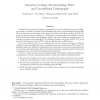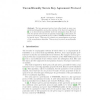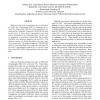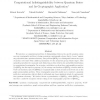103 search results - page 5 / 21 » Unconditionally secure cryptosystems based on quantum crypto... |
108
click to vote
CRYPTO
2010
Springer
15 years 2 months ago
2010
Springer
Motivated by the question of basing cryptographic protocols on stateless tamper-proof hardware tokens, we revisit the question of unconditional two-prover zero-knowledge proofs fo...
IMA
2001
Springer
15 years 5 months ago
2001
Springer
Abstract. The key agreement protocol are either based on some computational infeasability, such as the calculus of the discrete logarithm in [1], or on theoretical impossibility un...
DATE
2008
IEEE
15 years 7 months ago
2008
IEEE
Algebraic torus-based cryptosystems are an alternative for Public-Key Cryptography (PKC). It maintains the security of a larger group while the actual computations are performed i...
147
click to vote
IMA
2005
Springer
15 years 6 months ago
2005
Springer
In recent years cryptographic protocols based on the Weil and Tate pairings on elliptic curves have attracted much attention. A notable success in this area was the elegant solutio...
120
click to vote
EUROCRYPT
2005
Springer
15 years 6 months ago
2005
Springer
We introduce a computational problem of distinguishing between two specific quantum states as a new cryptographic problem to design a quantum cryptographic scheme that is “secu...




